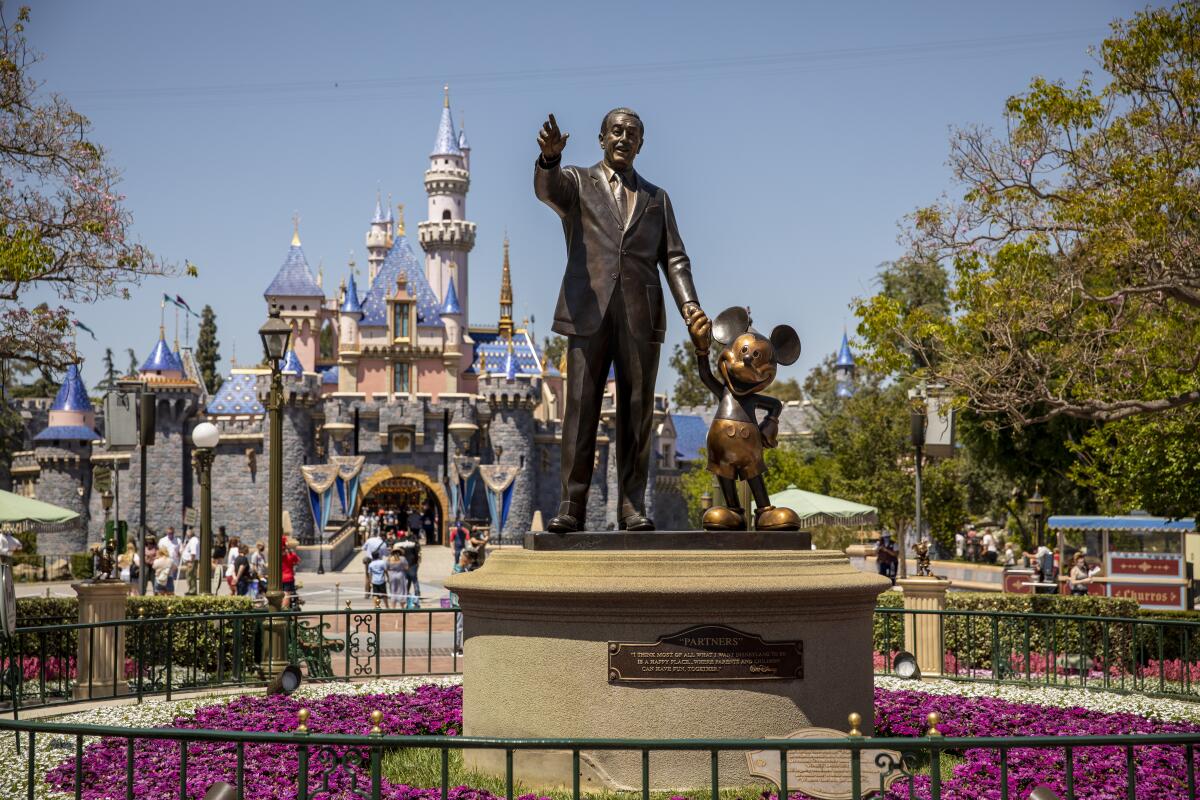Disneyland and Honda Center face 2% gate tax under Anaheim ballot proposal

- Share via
The Anaheim City Council will consider Tuesday asking voters to impose a 2% gate tax on visitors to Disneyland and the Honda Center to generate extra revenues to pay for additional staff and new city amenities.
If the council agrees to put the measure on the Nov. 8 ballot and a majority of voters approve it, the gate tax could generate $55 million to $82 million a year to be deposited in the city general fund account, according to a city report.
The proposal was made last month by City Councilman Jose Moreno, who said he hoped the gate tax money would bolster a city budget that he said has been stretched thin. Moreno, who is serving his last year on the council, has been a vocal critic of tax breaks for Disneyland.
“Given how much we have struggled ... just to help our seniors, we really need revenues,” he said when proposing the gate tax last month. “For a city of our size, we need more revenue.”
A Disneyland spokesperson declined to comment on the proposal. A representative for the Honda Center, home of the Anaheim Ducks, could not be reached for comment Monday.
The proposal is written to also impose a gate tax on visitors of Angel Stadium, but under the city’s lease agreement with the Angels, the city would be required to credit the Angels against its lease agreement for any “levies or assesses any ticket, admission, parking or other tax or fee based upon revenues derived from operations at the Baseball Stadium or Parking Area, or Team revenues.” In short, the lease agreement would ensure that a gate tax won’t boost the city’s coffers.
Getting the council to agree to put the measure on the ballot could be a challenge. Under city rules, the measure requires the support of five of the seven council members to pass. But the number of council members dropped from seven to six in May when Mayor Harry Sidhu stepped down after being accused of bribery, fraud, obstruction of justice and witness tampering. That means the measure needs five of the six remaining council members.
Mayor Pro Tem Trevor O’Neil has already voiced opposition to the proposal. “Increasing the already high tax burden on visitors runs the risk of negatively impacting tourism and the resulting economic impact for our city,” he said in a statement Monday. “And, this proposal would not only apply to visitors but to our own residents as well who enjoy the many entertainment options in our city.”
A daily ticket to Disneyland ranges from $104 to $164, depending on the day of the week, with a 2% gate tax adding $2.08 to $3.28 per ticket.
The proposal comes as the city’s primary revenue sources — sales taxes and occupancy taxes charged on hotel guests — have rebounded dramatically since the pandemic struck in 2020 and forced the closure of Disneyland Resort for more than a year and pushed hotel occupancy to near-record low levels.
The city is projected to collect $167 million in hotel occupancy taxes in the current fiscal year, surpassing the previous record high of $163 million in 2018-19, according to city budget records. Ten of the city’s largest hotels, including three Disneyland Resort hotels, generate about 50% of all the city’s hotel occupancy revenues.
Anaheim’s hotel occupancy tax of 15% is among the highest of Southern California’s most popular tourist destinations, including Los Angeles (14%), Long Beach (13%) and Pasadena (12%).
Anaheim is also projected to collect $97 million in sales tax revenues in the current fiscal year, surpassing the previous record high of $85 million in 2018-19, city budget records show.
In the last few years, the city’s once mutually supportive relationship with Disneyland Resort has been rocky.
For 19 years, Anaheim had in place a little-known measure to spare Disneyland Resort from any entertainment or gate taxes imposed by the city until 2015. The city extended the agreement for 30 years as long as Disney agreed to invest at least $1 billion in the resort. Disneyland met its obligation by building Star Wars: Galaxy’s Edge, a 14-acre expansion project that opened in 2019.
The agreement, and the goodwill between Anaheim and Disney, crumbled when the city canceled a $267-million tax rebate plan offered to Disneyland in exchange for building a luxury four-diamond hotel on the resort property. Frustrated Disney executives responded in 2018 by asking Anaheim to rescind all of its previous finance agreements, including the 30-year break on entertainment and gate taxes. That move opened the door to the proposed gate tax measure.
More to Read
Inside the business of entertainment
The Wide Shot brings you news, analysis and insights on everything from streaming wars to production — and what it all means for the future.
You may occasionally receive promotional content from the Los Angeles Times.











